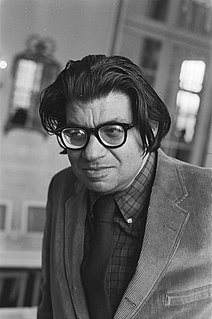Top 35 Quotes & Sayings by Morton Feldman
Explore popular quotes and sayings by an American composer Morton Feldman.
Last updated on April 20, 2025.
I have a very dear friend, a great painter, called me up very upset, the work wasn’t going well… He asked me to come to his studio -- which I did -- I looked around at the work, dozens of sketches, drawings, large pictures, and I was very close to his work, intensely involved with his work, and he asked me, ‘What’s wrong?’ And I said, ‘Simple – it’s a loss of nerve.
It appears to me that the subject of music, from Machaut to Boulez, has always been its construction. Melodies of 12-tone rows just don't happen. They must be constructed....To demonstrate any formal idea in music, whether structure or stricture, is a matter of construction, in which the methodology is the controlling metaphor of the composition...Only by 'unfixing' the elements traditionally used to construct a piece of music could the sounds exist in themselves--not as symbols, or memories which were memories of other music to begin with.
To me, I took a militant attitude towards sounds. I wanted sounds to be a metaphor, that they could be as free as a human being might be free. That was my idea about sound. It still is, that they should breathe ... not to be used for the vested interest of an idea. I feel that music should have no vested interests, that you shouldn't know how it's made, that you shouldn't know if there's a system, that you shouldn't know anything about it ... except that it's some kind of life force that to some degree really changes your life ... if you're into it.
























